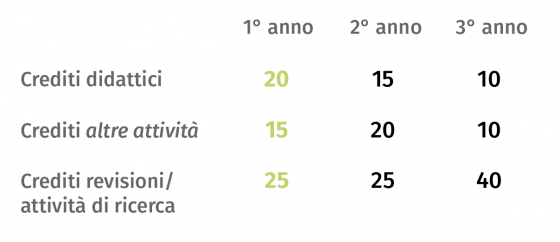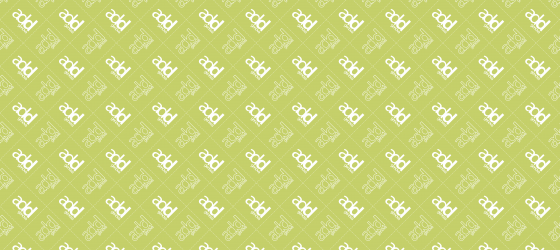
Educational Activities
The training credits that each PhD student will earn over the three years are organized into three main categories:
Teaching credits, linked to the direct acquisition of content structured and delivered by the Academic Board;
Credits for other activities, intended to stimulate the candidates’ curiosity through external experiences beyond the doctoral framework;
Credits for research progress assessment, aimed at producing and critically reviewing original content connected to each candidate’s individual research work.
The minimum 180 credits required over the three-year period are not evenly distributed but are organized to maximize training activities during the first year and scientific production and writing during the third year, as shown below.

The training calendar is structured in quarters and offers a credit load greater than the minimum required to complete the academic year, allowing each PhD candidate to choose activities coherent with their research path and cultural development.
As for the teaching credits, different formats are proposed in terms of content and delivery mode, each with its own frequency depending on the number of credits assigned. These formats include:
Thematic modules (1 credit per module, about 2 hours each), focusing on research tools and methodologies: research methods, applications, sources, and publishing workshops.
Workshops and ex-tempore sessions (4 credits for each event lasting at least two days — 1 credit if the event lasts one day, in which case it is considered a thematic module), focused on defining methods and tools for design, oriented toward collaborative design practices.
Lectures and Masterclasses (1 credit per event, regardless of duration), aimed at engaging with specialized topics, guest speakers, and international discussions promoting scientific exchange.
The credits related to research review and assessment are organized in two alternating quarterly formats:
Open Tables, informal roundtables open to the Board and external experts, where specific aspects of each candidate’s research are discussed;
General Reviews, also valid for annual evaluations and final exam admission.
Each of these activities provides 5 credits (10 credits per year for annual progression).
Additional credits may be obtained by attending courses offered by other doctoral programs, workshops, summer schools, or seminar cycles.
Credit Registration
To obtain the credits related to participation in Teaching Credit activities, it is necessary to proceed as follows:
Register one’s attendance by entering one’s name in the attendance form for each event, which is uploaded in the folder FILE – Attendance Sheets of the TEAMS channel Add Calendario_Dottorandi attivi.
Record the credits in the file 023_04_04_ADD_elenco studenti crediti.xlsx, located in the FILE folder of the TEAMS channel Add Calendario_Dottorandi attivi.
To obtain the credits related to participation in Other Activity Credits, it is necessary that the selected activity:
Is also aimed at PhD candidates or researchers;
Is relevant to the candidate’s research topic;
Has a minimum duration of 4 hours.
To obtain approval, the candidate must send a request to the PhD Office (dottoratodad@unige.it), providing a description of the selected external activity and a motivation letter illustrating the main characteristics and the actual scientific relevance of the course that they intend to attend.
Once the activity has been approved, the PhD candidate must record the credits in the file 023_04_04_ADD_elenco studenti crediti.xlsx located in the FILE folder of the TEAMS channel Add Calendario_Dottorandi attivi.
To obtain the credits related to participation in Research Review activities, it is necessary to proceed as follows:
Upload the abstract, the research progress report, and the material requested each time in the Research Review folder within the FILE folder of the TEAMS channel Add Calendario_Dottorandi attivi;
Register one’s attendance in person on the paper register during the review;
Record the credits in the file 023_04_04_ADD_elenco studenti crediti.xlsx located in the FILE folder of the TEAMS channel Add Calendario_Dottorandi attivi.
PhD Students’ Record Book
What it is:
It is the digital record book in which each PhD student registers their training activities. Its use is mandatory starting from the 40th cycle; however, students from the 38th and 39th cycles are also strongly encouraged to fill it in starting from the 2024/25 academic year.
How to access:
Online Services → Students → Postgraduate → PhD Students’ Record Book
https://servizionline.unige.it/web-studenti2/en/#/v2/libretto/5001University tutorial on Teams:
https://unigeit.sharepoint.com/:b:/r/sites/AddCalendario412-Dottorandiattivi/Documenti%20condivisi/Dottorandi%20attivi/Revisione%20attivit%C3%A0%20di%20Ricerca/libretto%20dottorandi/tutorial_ita.pdf?csf=1&web=1&e=UBAtOp
For further information, the internal guide to the PhD Students’ Record Book is available here.
Mission reimbursements
According to the new regulation adopted, PhD students may access the 10% allocation of the scholarship amount available to them.
This allocation may be used to cover the following expenses:
Missions and expenses related to participation in conferences, congresses, and summer schools;
Consumable materials;
Inventory goods (for example, books), which will remain the property of the Department of Architecture and Design;
Proofreading of the thesis, translation of the PhD thesis, translations and/or transcriptions of manuscripts or materials that will be included in the thesis or useful for the doctoral research;
Printing of the doctoral theses.
A prior request must be submitted to the PhD Course Coordinator at least 15 days before each meeting of the Academic Board.
The PhD administration will reimburse expenses related to activities supporting doctoral research in Italy or abroad, up to the amount of the aforementioned allocation.
For further information on the expenses that can be covered by this allocation, please contact the PhD Office at: dottoratodad@unige.it
Attachments:
Mobility request form for the coordinator (86.5 KB) Order form (65.5 KB)
Study period abroad
The PhD program encourages research interactions between candidates and other groups (universities, research centers, companies) in their field of study in order to develop their research work and thesis.
PhD candidates with UNIGE scholarships co-funded with PNRR funds: depending on the specific terms of the awarded scholarship, the internship abroad may be mandatory. Each PhD candidate must verify this requirement with their Tutor.
PhD candidates admitted through international agreements: the internship abroad is not mandatory; if undertaken, it may be carried out either in the country of origin or in Italy.
Key information:
Full period abroad: 6 months (12 credits)
Minimum period abroad: 3 months (6 credits)
It is allowed to stay abroad for more than 6 months (up to a maximum of 18 months); the number of credits does not increase.
To activate the exchange, it is necessary to have an invitation letter signed by the host university/research center specifying the dates of the period and a brief description of the activity to be carried out by the PhD candidate.
An invitation letter is required for each period abroad.
The internship may be carried out in more than one institution.
NB: For PhD candidates with a UNIGE scholarship: during the period abroad (minimum duration of 10 days and maximum of 6 months), the scholarship is increased by 50%, for a maximum of 6 months. Each request must be agreed upon with the candidate’s academic tutor.
Every time you participate in conferences, internships, or workshops abroad, you must:
Open a new mission request well in advance, fill in the attached form, and send it to dottoratodad@unige.it.
Every time you participate in conferences, internships, or workshops in Italy, you must:
Open a new mission request well in advance, fill in the attached form, and send it to dottoratodad@unige.it.
Attachments:
Training mobility form (243.01 KB)
Research progress
Reviews and Evaluation
Intermediate Review (1st, 2nd, and 3rd year)
Each year, candidates submit the ongoing work of their doctoral thesis to a committee composed of members of the Academic Board, in order to evaluate the progress of their research.
The intermediate reviews support the development of the doctoral path by defining the milestones to be achieved each year and by offering the opportunity to discuss the research in progress with the professors of the Department of Architecture and Design.
As illustrated in the previous scheme, the intermediate reviews take place in April.
Further information and the required formats will be provided by email approximately 2–4 weeks in advance by the PhD Office.
Annual Evaluation (1st and 2nd year)
At the end of the 1st and 2nd years (in the month of October), the doctoral committee evaluates the candidates’ activities to determine their admission to the following year.
The PhD candidate is required to prepare a PhD Annual Review, intended to concisely illustrate the research progress and the activities carried out.
The format is available in the FILE folder of the TEAMS channel Add Calendario_Dottorandi attivi.
The submission deadline and details of the procedure will be communicated by email approximately 2–4 weeks in advance by the PhD Office.
The annual review is structured as follows:
A short text summarizing the research progress (status of the research plan, etc.);
A list of activities and qualifications of the candidate;
A list of scientific production (publications);
A copy (or a selection) of the scientific publications listed, attached to the report.
Scientific Publication
University scientific production is a fundamental element for disseminating scientific knowledge and the research topics developed in each department, as well as for participating in an international exchange of ideas.
PhD candidates are required to obtain 10 credits within their training framework.
Conference proceedings or non-indexed journals: one publication in conference proceedings or non-indexed journals provides 5 credits.
Indexed journal: one publication in an indexed journal (WOS and/or Scopus) provides 10 credits.
The platform https://iris.unige.it/ is accessible through the University’s Online Services.
Each year, UNIGE personnel are required to upload their scientific publications to the IRIS platform – Institutional Research Information System, connected to the Ministry of Education, University and Research (MIUR). This is the institutional repository of publications produced by scholars and researchers of the University of Genoa.
UPLOADING TO THE IRIS–RE.PUBLIC PLATFORM IS MANDATORY
The reporting of UNIGE scientific production—sent to the “Ministry of Education, University and Research”—contributes to the national and international ranking of our University and consequently to the distribution of national funding.
Symposia
Each PhD candidate is required, over the three-year period, to organize at least one Symposium, which represents a moment of self-training and an opportunity for in-depth exploration of specific topics related to their own research.
It will be an event in which external experts will be invited to participate, contributing to strengthening and opening new issues related to the research itself.
In this way, new synergies will be created among PhD candidates at both the national and international levels, with the establishment of new connection networks.
This will also lead to the enhancement of the ADD Series, in which the curators will publish the results of the Symposium itself.
The organization of the Symposium allows each PhD candidate to acquire 10 Training Credits.
The Doctorate contributes to the co-funding of the Symposia and to the funding of the related digital publications.
Teaching Activities
Participation in teaching activities as a teaching assistant or research fellow is part of the ongoing synergy between teaching and research.
Therefore, PhD candidates may take part in courses or design studios as tutors during the three years, subject to the supervisor’s approval.
Key information:
To obtain a tutoring assignment within a course or a design studio, it is necessary to respond to the official call for tutoring and teaching activities.
PhD candidates may carry out a maximum of 40 hours per year.
PhD Credentials to access Unige services
To obtain UniGePASS credentials or to update contact details for password recovery, please refer to the following pages:
In order to create your own university email, you must follow the guide available at this link
Wifi
To access the Eduroam Wi-Fi network, simply enter your UniGePASS username followed by the suffix ‘@unige.it’ (for example: S1234567@unige.it), even if this identifier has no relation to your email address, and complete the process using the same password normally used to access university services.
Phd Teams Channels
